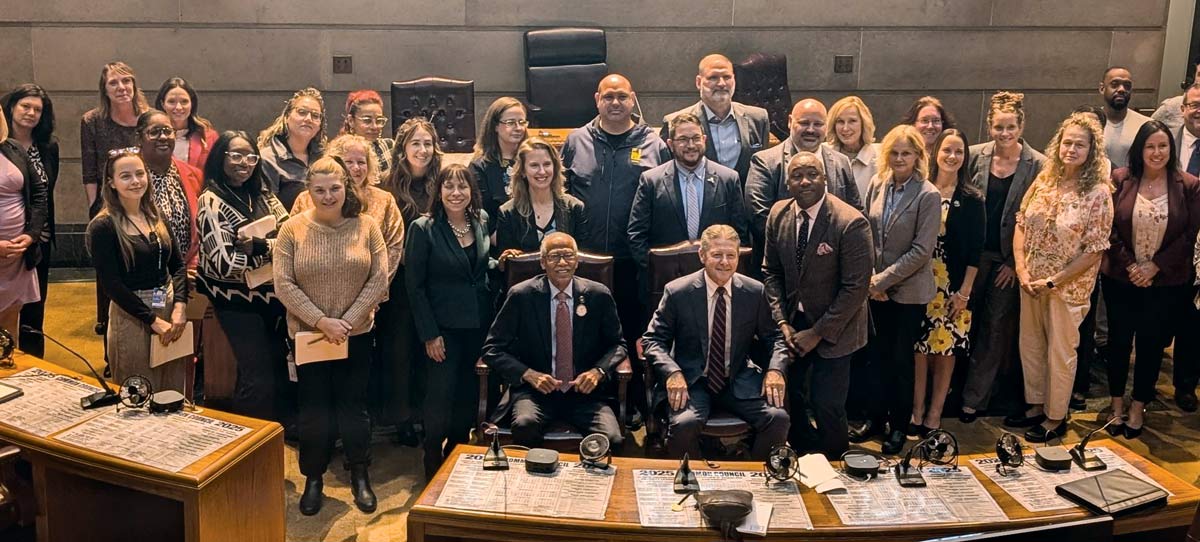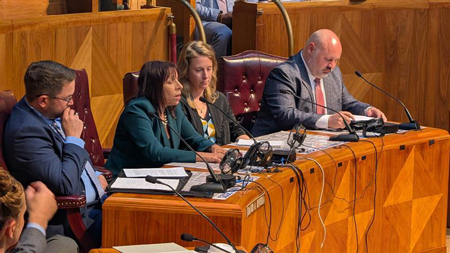

November 7, 2025 — A series of roundtables hosted by New York State Senator Robert Jackson were held last month in New York City, Albany and Buffalo. Senator Jackson chairs the Civil Service and Pensions Committee. The committee invited representatives from organized labor, as well as directors from the Department of Civil Service (DCS), Human Resource offices, and elected officials to participate in the discussions around how civil service works when applied to the local level.
Discussions ranged in topics from classifications, hiring and promotions, to civil service examinations. At the local level many of the policies, rules and regulations that are created by DCS must be followed by local county and city employers, like water treatment facilities.
Employers at the local level raised the question of employment barriers, like residency requirements, which can prevent someone who does not live in a certain geographical area from getting a job in civil service and expressed concerns regarding the cap on wages for retirees. Local governments discussed changes to state laws that would remove the cap on wages for retirees who re-enter the civil service workforce.
The roundtable also discussed the use of NY HELPS, the temporary DCS initiative which waived civil service exams for thousands of positions to address a statewide staffing crisis. It is set to expire in June 2026. Representatives from local government praised NY HELPS for giving them an avenue for offering permanent appointments to civil servants who have been in provisional appointments for years.
“The high number of provisionals in state and local government are the result of poor exam planning on the part of the Department of Civil Service,” said Veronica Foley, PEF’s Director of Civil Service Enforcement and Research. “NY HELPS was initially proposed as a way for the State to reinforce their testing program, but in reality promotion exams have been diminished and access to exams has not yet improved.”
Participants at the meetings felt that little information has been shared with all stakeholders about plans for recruitment and retention efforts once NY HELPS ends. PEF and other unions know that the State wants to eliminate written exams for open competitive titles and replace them with Training and Experience evaluations. PEF argues that no details have been shared with stakeholders regarding how this form of examination will be competitive.
PEF opposes a blanket transformation away from competitive examinations and believes that it is against New York’s mandate to uphold merit and fitness-based hiring practices that safeguard against cronyism.
As DCS continues to push for changes that PEF believes will erode the current merit and fitness practices, PEF does support DCS in opening regional computer-based testing centers. DCS claimed in May 2025 that 12 sites would be opened by March 2027 and that four would be open for prototype testing by the end of summer 2025. As of November 2025, no testing sites are operational.
PEF also supports the State’s plan to implement a job application management system that will help streamline the hiring process and reduce the time between taking an exam and being hired. Lastly, PEF is eagerly awaiting the results of the Total Compensation Study that the State has conducted. Foley said PEF looks forward to reviewing its recommendations that the union hopes will aid in retaining workers.
“DCS must do better when it comes to communication and addressing systemic failures in ways that uphold merit and fitness, not erode it. The stakeholders at the roundtables agreed with us on this point in particular,” said Foley. “We hope that the roundtable made clear not only PEF’s position but also the concerns that the decisions being made at DCS are being made without the input of major stakeholders.”

